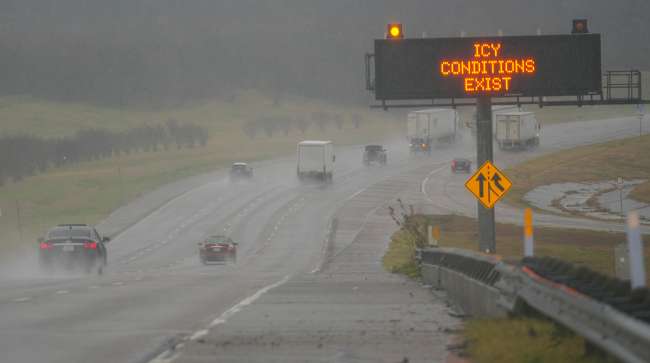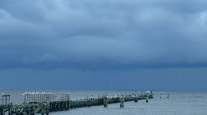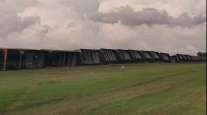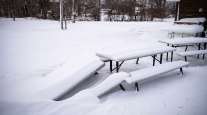Associated Press
Winter Storm Prompts States of Emergency Across South

[Stay on top of transportation news: Get TTNews in your inbox.]
DALLAS — A powerful winter storm that dumped heavy snow and glazed roads with ice across much of Texas and Oklahoma lumbered eastward into southern U.S. states Jan. 10, prompting governors to declare states of emergency and shuttering schools across the region.
Arkansas Gov. Sarah Sanders mobilized the National Guard to help stranded motorists. School was canceled for millions of children across a wide tract of southern states from Texas to Georgia and as far east as South Carolina.
Some of the heaviest snowfall was expected Jan. 10 across the northern half of Arkansas and much of Tennessee, with totals in some parts of those states ranging from 6 to 9 inches, according to the National Weather Service.
Farther south and east into Louisiana, Mississippi and Alabama, a wintry mix of sleet and freezing rain made travel treacherous.
The storm dumped as much as 7 inches in some spots in central Oklahoma and northern Texas before pushing into Arkansas. More than 4,500 flights were delayed and another 2,000 canceled on Jan. 9, with more delays and cancellations expected Jan. 10.
People do not need to be driving.
Charles Daniel, truck driver
“I have not seen any accidents, but I have seen a couple of people get stuck out on the road and sliding around,” said Charles Daniel, a truck driver hauling a 48-foot trailer loaded with paint, auto parts and other supplies through slick, slushy roads in central Oklahoma on Jan. 9. “People do not need to be driving.”
The polar vortex of ultra-cold air usually spins around the North Pole, but it sometimes ventures south into the U.S., Europe and Asia. Some experts say such events are happening more frequently, paradoxically, because of a warming world.
The cold snap coincided with rare January wildfires tearing through the Los Angeles area.
Paul Kirkwood, a National Weather Service meteorologist, said the storm that swept through the Dallas area will create a “swath of snow” impacting parts of Mississippi, Georgia, Tennessee, Kentucky, North Carolina and South Carolina.
❄️A winter storm is expected to bring heavy snow, freezing rain, & ice across the South over the next few days. Widespread snowfall of over 4" is expected, with isolated instances of 8" possible. Dangerous driving conditions, power outages, & downed branches are also possible. pic.twitter.com/WaDw6Qw67G — NWS Weather Prediction Center (@NWSWPC) January 9, 2025
Texas Gov. Greg Abbott urged residents to avoid driving if possible. Roads could be dangerous as 75,000 fans were expected Jan. 10 at AT&T Stadium in Arlington for the college football championship semifinal between Texas and Ohio State in the Cotton Bowl.
The system was expected to push northeastward by Jan. 10 with heavy snow and freezing rain all the way to the Virginia and North Carolina coasts. As much as 8 inches of snow could fall in parts of Georgia, North Carolina, Tennessee and West Virginia through Jan. 11, the weather service said.
Georgia Gov. Brian Kemp declared a state of emergency on Jan. 9 as the northern half of the state girded for snow and ice beginning the morning of Jan. 10. Weather service forecasters warned snow and ice are likely to accumulate across metro Atlanta, making roadways treacherous and possibly causing power outages.
Public school systems across metro Atlanta and north Georgia called off in-person classes for Jan. 10, with more than 1 million students getting a snow day or being told to stay at home to learn online.
I have declared a statewide State of Emergency ahead of tomorrow’s inclement weather to ensure we are as prepared as possible for the winter storm.
Hazardous conditions can develop quickly and make travel dangerous, so I encourage all Georgians to stay vigilant as transportation… — Governor Brian P. Kemp (@GovKemp) January 9, 2025
In Tennessee, Memphis-Shelby County Schools, the largest district in the state with more than 100,000 students, closed all schools Jan. 10. With Memphis forecast to receive up to 8 inches of snow, officials said two warming centers are open 24 hours to provide shelter for people who need to escape the cold.
Parts of South Carolina prepared for the first wintry weather in three years. The state Department of Transportation dusted off its brine and salt supply and began treating interstates and other major highways from Columbia north on Jan. 9. School systems in those areas either will close early or all day Jan. 11 or hold online learning days.
In North Carolina, Gov. Josh Stein declared a state of emergency in advance of the storm, which forecasters say could bring up to 3 inches of snow to many parts of the state, with higher amounts in mountain areas. Sleet and freezing rain was also likely.
The approaching storm prompted the cancellation of a public outdoor inauguration ceremony for Stein and other statewide elected officials in Raleigh on Jan. 11.
Want more news? Listen to today's daily briefing above or go here for more info
Richmond, Virginia, was under a boil-water advisory as officials worked to restore the water reservoir system, which was shut down Jan. 6 after a storm caused a power outage, Mayor Danny Avula said.
The city of more than 200,000 was distributing bottled water at 11 sites and delivering it to older residents and others unable to get to those locations, officials said.
Associated Press reporters Sean Murphy in Oklahoma City, Adrian Sainz in Memphis, Tenn., Heather Hollingsworth in Kansas City, Charlotte Kramon in Atlanta, Jeffrey Collins in Columbia, S.C., Nadia Lathan in Austin, Texas, Ben Finley in Norfolk, Va., Andrew DeMillo in Little Rock, Ark., Kimberly Chandler in Montgomery, Ala., John Raby in Cross Lanes, W.Va., and Dylan Lovan in Louisville, Ky., contributed to this report.




